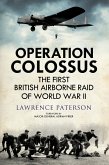The Royal Air Force had placed a great deal of faith in its force of bombers, Bomber Command, in the event of a future war. The belief in the ability of formations of bombers flying in daylight and unescorted, protecting themselves from enemy fighter attack, informed early tactics but led to bloody losses. Hampered by government restrictions on targets, by late 1941 Bomber Command was in crisis. As a result, and coupled the growing dire war situation, a new and forceful commander, Sir Arthur Harris, was appointed and new strategies allowed Bomber Command to broaden its attacks despite some opposition. The result was the area bombing strategy which focussed attacks upon enemy held towns and cities. This Main Offensive period lasted throughout 1943-1944 and saw both victories and defeats. It was also the period that saw a limited number of precision attacks; on Augsburg, Peenemunde and, most famously, the Ruhr dams. Bomber Command also aided in tactical and strategic support for the invasion of Europe and the subsequent fight to push inland. New technological developments allowed Bomber Command to hit V-Weapons sites and to focus more on precision bombing, but Harris remained determined to hit German towns and cities whenever possible, while the Command's growing power allowed it to rain devastation upon its targets, culminating at Dresden. Much has been written about Bomber Command, but this book focusses largely on those who took part in the raids and on public attitudes towards the campaign in Britain. Using accounts from national and local archives, newspapers and existing historiography, the book seeks to shed light on untold stories from Bomber Command's war.
Dieser Download kann aus rechtlichen Gründen nur mit Rechnungsadresse in A, B, BG, CY, CZ, D, DK, EW, E, FIN, F, GR, HR, H, IRL, I, LT, L, LR, M, NL, PL, P, R, S, SLO, SK ausgeliefert werden.









